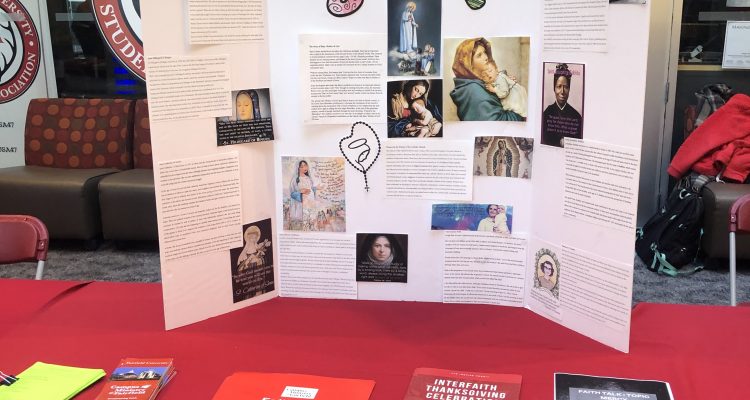Leaders of different faiths came together with students and faculty of all backgrounds for a discussion and celebration of differences, as well as similarities, at the “Festival of Faiths” on Wednesday, Nov. 13 in the lower level of the John A. Barone Campus Center.
The Office of Student Diversity and Multicultural Affairs and Campus Ministry came together, along with First Year Experience and the Center for Faith and Public Life to host a Chaplain’s panel starting at 12 p.m. The four faiths represented in the panel were Judaism with Rabbi James Prosnit, Protestantism with Reverend Jay Glover, Islam with Kemal Cecunjanin and Catholicism with Father Rourke, the Director of Campus Ministry.
Katie Byrnes, campus minister for social justice and community engagement, said via email in regards to the Festival of Faiths, “The goal is to celebrate and share the wide diversity of faiths present here at Fairfield and many ways in which those traditions engage around the topic of ‘Radical Hospitality.’”
“Radical hospitality” the fourth pillar of Fairfield’s Diversity and Inclusive Excellence Mission Statement, which includes additional pillars of “Inclusive Excellence,” “A Diverse Community” and “Global Engagement.” According to Fairfield’s website, radical hospitality is about, “living in an increasingly interconnected, intercultural world and reflects this by striving to become a microcosm of the global community, in which the other is unconditionally welcomed, respected, and valued.”
This concept has become increasingly popular over the past few years, and here on Fairfield’s campus it is being emphasized more than ever with the Class of 2023. Students are encouraged to create a strong sense of community in any way possible, small or big. The value Fairfield places on “radical hospitality” was highlighted through the panel discussion of the concept and how it is embraced in various religions.
In front of 15 students, and numerous staff members and student leaders, each of the four panelists spoke about their traditions of “radical hospitality,” and in doing so, highlighted both the diversity and commonality between the different faiths.
Rabbi Prosnit spoke about the word ‘companionship,’ and its Latin roots, breaking the word into ‘companion’ and ‘bread.’ He went on to explain that in the Hebrew tradition, it is common practice to welcome others and form human connections over bread, or food in general. He suggested to students to take this tradition to the Daniel and Grace Tully Dining Commons in order to create meaningful and respectful relationships with others.
“Go beyond your comfort zone,” said Rabbi Prosnit. He expressed that he believed sharing a meal with people you believe yourself to be different from is a great way to create a sense of community in the world around you.
Reverend Glover took the idea of ‘radical hospitality’ to the act of service.
“Irregardless of our social location, we can use our privileges to serve others,” Rev. Glover said. “We should treat others’ needs as holy, and dedicate our lives to bettering theirs.”
All of the panelists echoed this belief in the importance of helping others in their own way. “Religion isn’t just about prayer,” said Cecunjanin. He shared personal examples of helping others, speaking about people of the Muslim faith living in Europe and America who take their earned privileges to send money back to family and friends still living in poor towns and villages so they can build mosques and continue in their faith lives.
Father Rourke expressed the importance of the act of giving back as well. He spoke of the Catholic tradition of the offertory, which is the part of the Catholic mass when the congregation is asked to give money to the parish. He explained that through sacrificing some money, people can hope to be using any amount of their privileges that they can to better the world around them. “To be able to worship God properly, we have to be willing to serve our brothers and sisters,” Fr. Rourke said.
Following the panel discussion, students were invited to browse the surrounding tables that had information and presentations put together by various faith-related organizations on campus.
“Our hope with this event is that people realize that faith traditions don’t differ as much as we think they do,” said Fallon Sullivan ‘20, an Interfaith Peer Leader. “It’s not only our similarities, but our differences that bring us together.”
During the panel discussion, many of the panelists made a connection between food and hospitality, so it seemed fitting the event culminated in attendees and organizers joining in a meal that included food from all of the faiths and cultures represented at the event. The food line grew longer as more people filtered through the LLBCC. In the tradition of hospitality, those organizing the event welcomed all students and faculty present in the LLBCC to come and join them over a meal.They joined in conversation over pretzels, dates, baklava, potato latkes, rice and halal and mini vegetable samosas.
In conversation, another Interfaith Peer Leader, Carlin Fournier ‘22 said, “we want everyone to understand that we are all human beings, and that is what unites us. That is where we can find commonality.”


Leave a Reply